The Blind Goddess Read online
Page 9
“Mafia Behind Two Murders” it announced in trenchant terms. Håkon Sand found the story barely recognisable. He read the front page and the two full inside pages that the newspaper had devoted to the subject. Across the top of each page was a black strip with a white text: “The Mafia Affair.” He ground his teeth in annoyance at the exaggerations, but on closer reading he could see that Myhreng hadn’t promulgated any actual untruths. The facts were stretched, the speculations far-fetched and so well camouflaged that they could easily be taken for truth. But Håkon himself had been quoted accurately and so couldn’t really complain.
“Well, it could have been worse,” he said, passing the paper to Karen Borg, who was now sufficiently at home in his office to collect what passed for coffee from the anteroom herself.
“It’s time you told me something about this client of yours,” he demanded. “The man’s still sitting around in his underpants refusing to talk. Now we know as much as we do, you ought in all decency to help us along a bit.”
They stared at one another intently. Karen reverted to the type of silent contest they used to have when they were students. She held his gaze, held it so focused that everything except her grey-green eyes diffused in a mist. He could see the tiny brown specks in the iris, more in the right eye than the left; he couldn’t blink, didn’t dare to for fear that his own gaze would drop when his eyes reopened. Hell, he’d never managed to win this game. She always managed to outstare him until he lowered his eyes in embarrassment, the loser, the lesser of the two.
But this time she was the one who had to give in. He could see her eyes filling with water, she had to blink, and her gaze slid to the side as if nudged by the faint flush that had begun to spread over her left cheek. He was astonished at his own tenacity; she was exposed on the flank. But the victor did not exult; instead he took both her hands in his.
“I’m actually rather apprehensive,” he admitted. “We don’t know much about this gang, or mafia as they’ve now been called, but we do know they’re not choirboys. The newspaper probably has some evidence for saying they’d go to any lengths to defend themselves and their own interests. We have reason to believe that they know that you know something. Or anyway that they suspect you do.”
He told her about Hanne Wilhelmsen’s memo, that must now be in the wrong hands. He could see that this made an impact on her. Her whole bearing was transformed as he’d never seen it before, as if she were looking to him for some kind of protection, to Håkon, whom she had protected and bullied through all their student years.
“We’ll have no chance of protecting you unless you tell us what you know!”
He realised he was gripping her hands too hard. They’d gone white, with crimson indentations where he’d held her. He let go of them.
“Han van der Kerch has told me a little. Not much. He doesn’t want it to go any further, but there is one thing I’ve got his permission to tell you. I don’t know whether it’s any use.”
She had pulled herself together now. She was sitting up straight again, and her suit hung neatly in place.
“He was collecting the money for a delivery. As he counted the bundle of notes, he saw that one had been written on in ink. A telephone number. Which he’s forgotten. But next to the number were three letters. He had the impression they might have been initials; they had full stops between them. He remembers the initials, because they were pronounceable: J. U. L.”
“JUL?”
“Yes, with full stops. He had joked to the man who was giving him the money that he didn’t want defaced notes. The man had snatched it back and been quite brusque with him.”
“Have you thought about what it could mean?”
“Yes, I have.”
There was silence for a moment, and they fell back into a familiar set pattern.
“What have you thought, then, Karen?” Håkon asked softly.
“It’s occurred to me that there’s a lawyer in Oslo with exactly those initials. And only one—I checked through the Lawyers’ Association membership list.”
“Jørgen Ulf Lavik.”
Håkon’s guess was not as impressive as it sounded. They’d both been students at the same time as Lavik, who was even then a popular character. Gifted, loads of friends, and politically committed. Håkon had thought for ages that Karen was in love with him, which she had dismissed at the merest hint. Lavik was fairly conservative, and Karen Borg had been the Socialist Front representative on the Faculty Committee. In those days such barriers were virtually insurmountable, and Karen had often described her fellow student as a reactionary shit in front of others and even Lavik himself. They’d only been on speaking terms a few times, once when they’d made common cause against restrictions on student numbers. He’d actually been to her parents’ summer cottage out at Ula for what was intended as a student political seminar, but had turned into purely a pleasure jaunt. She hadn’t liked him any better after that.
“I don’t understand what all this is about, but the newspaper insinuated that there might be lawyers behind some kind of gang. I can’t really see Jørgen Lavik as a gang leader, but you’re welcome to the information for what it’s worth.”
The information was worth quite a bit to Håkon. Its value rose when Karen added a few moments later, “You’ll find this out for yourself, but to save you the trouble: Jørgen began his career as a lawyer’s clerk with one of the big names. Can you guess who?”
“Peter Strup,” said Håkon immediately, and his face relaxed into a huge grin.
Before Karen Borg left police headquarters that afternoon she was given a two-way radio on loan. She thought it resembled an old-fashioned walkie-talkie, larger and more awkward than a mobile phone. She had to twist a button, and it would rasp and scrape as in an American detective film. Then press another button and she would be in direct contact with the police operations room. She was BB 04, the ops room was 01.
“Keep it with you at all times,” Håkon commanded. “Don’t hesitate to use it. The ops room knows about you. The police will be with you in five minutes.”
A lot can happen in five minutes, thought Karen Borg.
THURSDAY 15 OCTOBER
Once, a long, long time ago, she had flirted with him shamelessly. She was not commissioner then, but an inspector in the minor offences unit, and newly appointed to the prosecution service. They were travelling to Spain to gather evidence for an alcohol smuggling case, her very first foreign trip on official business. The man sitting in front of her now in the visitors’ chair had been there as defence counsel. Gathering the evidence had taken three hours. The visit had lasted three days. There had been lots of good food, and even more good wine. He had been everything she admired: significantly older than herself, rolling in money, considerate, and successful. Now he was parliamentary under secretary in the Ministry of Justice. Not bad. During their trip ten years previously things had gone no further than a kiss and a cuddle. Which had not been her choice. So she felt slightly bashful now.
“A cup of coffee? Tea?”
He accepted the former, and declined a cigarette.
“Given up,” he smiled, waving it away.
She could feel that her hands were damp, and regretted that she hadn’t got out a few documents or something else to occupy them. Instead, she sat there twiddling her thumbs and rocking nervously back and forth in her enormous chair.
“Congratulations on your appointment!” he exclaimed. “Not bad, eh?”
“It was completely unexpected,” she lied.
The fact was that she had been invited to apply. By the former commissioner. So it was no surprise to anyone when she got the job.
The under secretary looked at the clock, and came straight to the point.
“The minister is very concerned about this lawyer affair,” he explained. “Very concerned indeed. What’s it actually all about?”
She may have made blatant advances to the man many years ago, and still be very enamoured of him, a feeling in no way d
iminished by his rank, but she was a professional to her fingertips.
“It’s a difficult case, and still rather unclear,” she replied vaguely. “There’s not much I can say. Beyond what’s in the newspapers. Some of which is correct.”
He adjusted his silk tie. He cleared his throat meaningfully, as if to let her know that he, as the minister’s closest political subordinate, had a right to better information than appeared in the more or less (principally the former) unreliable tabloid press. But it was no use.
“Investigations are at a very early stage, and the police aren’t yet ready to issue any information. If anything emerges during the course of the investigations that we think the Ministry’s political office ought to know about, you’ll hear from me immediately of course. I promise.”
That was all he would get out of her. He was old enough to realise the fact. So he didn’t persist. As he left the office, she observed that the extra kilos made his backside a lot less appealing. When the door had closed, she smiled, very pleased with herself. The ample bottom apart, he was still attractive. There would be other opportunities. A grey hair drifted silently down onto the desk, and she hastily pounced on it. Then she rang her secretary’s number.
“Make an appointment for me at the hairdresser’s,” she said peremptorily. “As soon as possible, please.”
Han van der Kerch was beginning to lose track of time. The lights were switched off to let the remand prisoners know when it was night, and the unappetising plastic-packed food was served punctually, dividing their lives into segments that fitted together to make a day. But without a glimpse of sun or rain, wind or cloud, and with far too much time that could only be used for sleeping, the young Dutchman had sunk into an apathetic state of semiexistence. One night, when five hours’ sleep during the day resulted in unbearable nocturnal wakefulness, having to listen to painful sobbing from a young lad in the adjoining cell and piercing screams from a Moroccan with withdrawal symptoms further down the corridor, he thought he would soon go mad. He prayed to a God he hadn’t believed in since he used to go to Sunday school as a child, prayed for daybreak and the bright ceiling light. God had obviously forgotten him, just as Han van der Kerch had forgotten God, because morning never came. In his desperation he had flung his recently returned wristwatch against the wall and smashed it. Now he couldn’t even follow the passage of time on its painful and relentless march towards a blank future without content.
The sturdy, myopic woman who brought the trolley of prison food round would occasionally give him a piece of chocolate. It made it feel like Christmas. He broke it up into tiny fragments and let them melt on his tongue one after another. The chocolate hadn’t prevented him from losing weight; after three weeks’ incarceration he was seven kilos lighter. His clothes no longer fitted him, but that was of little significance in his present circumstances, where he sat sometimes in his underpants, sometimes stark naked.
He was also afraid. The fear that had taken hold of him like an expanding cactus in his stomach as he stood over Ludvig Sandersen’s disfigured body had spread to his limbs. His hands and arms were trembling and he was spilling all his drinks. At the beginning he’d managed to read the books he was allowed to borrow, but gradually his powers of concentration waned. The letters danced and leapt about on the page. He’d been given pills. That’s to say, the warders had been given the pills, and they were handed to him one by one according to the doctor’s instructions, with a plastic mug of tepid water. Tiny bright blue pills in the evening which helped him along the road to dreamland. Three times a day he had bigger white pills. They gave him a sort of breathing space as the cactus temporarily retracted its needles. But the certainty that they would return, stronger and sharper, was almost as bad. Han van der Kerch was starting to lose his grip on his own existence.
He thought it was day. He couldn’t be certain of it, but the light was on, and there were noises going on all around him. A meal had just been served, though he wasn’t sure whether it was meant to be lunch or dinner. Perhaps it was a late supper. No, it was too early, too much noise.
At first he couldn’t see what it was. When the piece of paper dropped in through the bars it took him a while to work it out. He followed its progress; it was small and almost weightless and took ages to reach the floor. It fluttered like a butterfly, from side to side, as it bobbed down towards the concrete. He smiled, the motion was pleasing, and he felt it had nothing to do with him.
There it lay. Han van der Kerch left it where it was and raised his eyes again to follow the shadows of movement from the corridor. He’d just taken one of the white pills, and felt better than he had an hour ago. He made a laborious effort to stand up. He was dizzy, and had been lying for so long in the same place that his limbs had gone to sleep. They tingled uncomfortably as he hobbled the few steps to the door. He bent and picked up the piece of paper without looking at it. It took several minutes to get himself into a normal sitting position, without his legs complaining too much.
It was the size of a postcard, folded twice. He opened it up on his lap.
The message was clearly intended for him. A few words written in capitals with a broad-nibbed pen: “Silence is golden, talk and you’re dead.” It was rather melodramatic, and he began to laugh. His laughter was shrill and so loud that he startled himself and fell silent. Then a sense of fear came upon him that was utterly overwhelming. If a piece of paper could find its way through the bars of the door, so could a bullet.
He started laughing again, just as loud and shrill as before. The laughter echoed around the walls, bounced to and fro, and did a little jig around its performer before disappearing out through the bars and taking with it the last remnants of sanity from the Dutchman’s mind.
FRIDAY 16 OCTOBER
Two murdered and two in hospital. And all we have to go on are some initials and the vaguest of suspicions.”
It sounded as if they were wading through piles of crisp new banknotes: the yellowing maple leaves had experienced their first night of frost. Patches of fresh snow lay here and there, the nearest it had fallen to the city centre so far. They had arrived at the top of the hill in St. Hanshaugen Park, and the city lay spread before them in its frostbitten autumn pallor. It seemed as caught out by the sudden cold as the motorists on Geitemyrsveien, sliding into one another on their fully inflated summer tyres. The sky looked low. Only the church spires, the high one at Uranienborg and two shorter ones not so far away, were preventing it from total collapse.
Hanne Wilhelmsen had been discharged from hospital, but was hardly in a condition for lengthy walks in the woods. Nor should she really have been inflicting problems on her battered brain, but Håkon Sand couldn’t resist the temptation when she rang and suggested going for a gentle stroll. She was still pale and bore clear signs of her ordeal. The blueness on her jaw had turned light green, and the enormous bandages had been exchanged for large plasters. Her hair was completely lopsided, which surprised him. He’d thought she would have cut it all the same length to match the part that had been shaved smooth, a large area above one ear. When they met, with cautious smiles and a somewhat awkward pleasure at seeing one another again, she had immediately explained that she hadn’t wanted to sacrifice the rest of her long hair. Even though it definitely looked very odd.
“Only one in hospital,” she corrected him. “I’m on my feet again.”
“Yes, from that point of view you’re luckier than our Dutch friend. He’s had a complete breakdown. Retroactive psychosis, the doctor says, whatever that may mean. Stark, staring mad, I should think. He’s in the psychiatric wing at Ullevål Hospital now. Not that there’s any reason to assume he’ll be any more talkative after that. At the moment he’s curled up in the foetal position and burbling like a baby. Scared stiff of everything and everyone.”
“Very strange,” said Hanne, sitting down on a bench. She patted the space next to her and he obeyed.
“Strange that it should happen after only three weeks,” she
went on. “I mean, we know what it’s like in those cells. Not exactly a holiday camp. But people are always being held there too long. Have you ever heard of anyone going stir-crazy before?”
“No, but he probably has more reason than most to panic. A foreigner, feeling of isolation and all that.”
“But even so . . .”
Håkon had learnt to listen when Hanne spoke. He hadn’t pondered very much himself about Han van der Kerch’s mental state, just registered the fact resignedly; yet another door slammed in their face in an investigation that was more or less at a standstill.
“Could something have triggered it off? Could anything have happened to him in his cell?”
Håkon didn’t answer, and Hanne said no more either. Håkon had that peculiar sensation of well-being he always experienced in Hanne’s presence. It was something new in comparison with other women he’d met, a kind of comradeship and professional rapport together with the absolute certainty that they liked and respected each other. It occurred to him that they ought to become friends, but he rejected the thought. He realised intuitively that it was she who would have to take the initiative if they were to be more than colleagues. As he sat there now, on an ice-cold bench in St. Hanshaugen Park on a grey October day, he was more than happy with the feeling of being at one with this woman, who was so close and yet at the same time so remote, so intelligent, and so vital to the job he was trying to do. He hoped she wasn’t having too bad a time.
“Was anything of interest found in the cell?”
“No, not as far as I know, and what the devil could there be anyway?”
“But did they look for anything?”

 A Grave for Two
A Grave for Two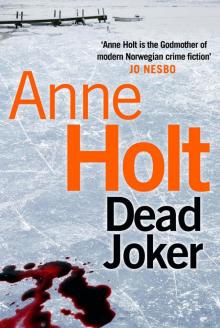 Dead Joker
Dead Joker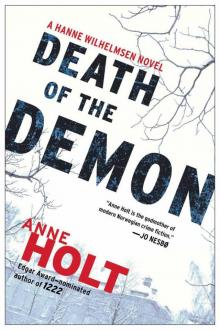 Death of the Demon: A Hanne Wilhelmsen Novel
Death of the Demon: A Hanne Wilhelmsen Novel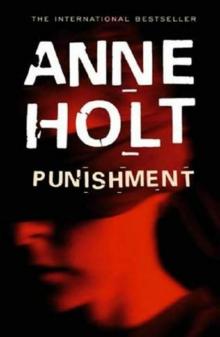 Punishment aka What Is Mine
Punishment aka What Is Mine Beyond the Truth
Beyond the Truth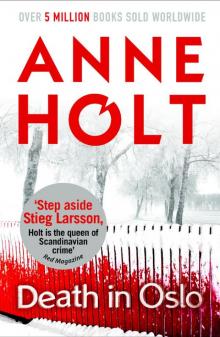 Death in Oslo
Death in Oslo The Blind Goddess
The Blind Goddess What Never Happens
What Never Happens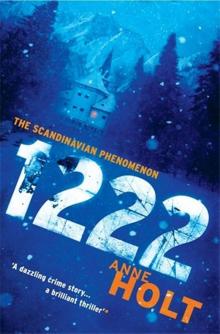 1222
1222 In Dust and Ashes
In Dust and Ashes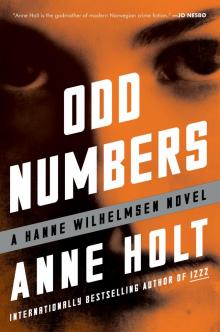 Odd Numbers
Odd Numbers What is Mine
What is Mine What Dark Clouds Hide
What Dark Clouds Hide Blessed Are Those Who Thirst
Blessed Are Those Who Thirst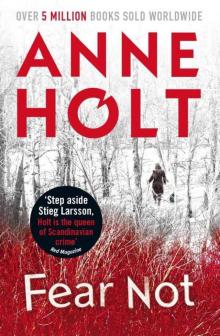 Fear Not
Fear Not No Echo
No Echo Hanne Wilhelmsen - 01 - The Blind Goddess
Hanne Wilhelmsen - 01 - The Blind Goddess